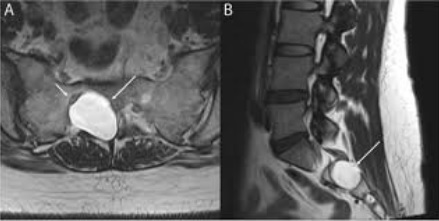Tarlov Cyst
A Tarlov cyst, also known as a meningeal or perineural cyst, refers to a fluid-filled sac situated on the nerve roots extending from the spinal cord. Typically containing cerebrospinal fluid (CSF), which surrounds the brain and spinal cord, these cysts primarily occur in the lower back (sacrum) and may develop following an injury. While individuals may have multiple Tarlov cysts simultaneously, their size can vary significantly. Often discovered incidentally while investigating other spinal conditions, most cysts remain asymptomatic. However, larger cysts can provoke symptoms such as pain, bowel and bladder dysfunction, or numbness. Estimating the prevalence of Tarlov cysts proves challenging due to their varying symptomatology, yet one study approximated that nearly 4% of individuals in the United States may experience this type of cyst.

Symptoms
The symptoms associated with Tarlov cysts can significantly impact an individual's quality of life, although they vary in severity and presentation based on factors such as the size and location of the cyst. While a majority of individuals with Tarlov cysts remain asymptomatic, larger cysts are more likely to produce noticeable symptoms.
Lower back pain is a common symptom experienced by those with Tarlov cysts, often described as a persistent discomfort in the lower back region. Additionally, individuals may report sensations of shock or burning originating from the lower back and radiating down the legs, known as radicular pain. This type of pain can be sharp, shooting, or electric in nature.
Numbness, weakness, or a loss of sensation in the legs are also frequently observed symptoms, indicating potential nerve compression or irritation by the cyst. These sensory disturbances can affect mobility and overall function.
Furthermore, Tarlov cysts can interfere with bladder and bowel function, leading to difficulties in regulating urination and defecation. Constipation is a common complaint among individuals with symptomatic Tarlov cysts.
Headaches may also occur in some cases, although the relationship between Tarlov cysts and headaches is not fully understood. Additionally, sexual dysfunction, such as erectile dysfunction or loss of libido, may be attributed to the presence of Tarlov cysts, particularly if the cysts exert pressure on nearby nerves involved in sexual function.
Overall, while Tarlov cysts are often benign and incidental findings, individuals experiencing any combination of these symptoms should seek medical evaluation for proper diagnosis and management.
CausesThe exact etiology of Tarlov cysts remains uncertain, although research suggests several potential contributing factors. These cysts may develop as a result of:
Cerebrospinal fluid (CSF) leak: Traumatic spinal injuries can lead to disruptions in the protective covering (sheath) surrounding the nerve roots, potentially causing CSF to leak and accumulate, resulting in the formation of Tarlov cysts.
Inflammation of the nerve root sheath: Inflammation of the protective sheath surrounding the nerve roots may trigger the development of Tarlov cysts, although the precise mechanisms underlying this process are not fully understood.
Furthermore, the size of Tarlov cysts can be influenced by fluctuations in CSF pressure. It is normal for CSF pressure to vary, and increases in pressure can lead to an expansion of the cysts. Individuals may notice changes in cyst size and associated symptoms during activities that elevate CSF pressure, such as lifting weights or performing strenuous physical tasks. These fluctuations in CSF pressure may exacerbate symptoms or make them more noticeable, highlighting the dynamic nature of Tarlov cysts and their potential impact on symptomatology.
Diagnosis
Diagnosing a Tarlov cyst typically involves a thorough evaluation conducted by a healthcare provider, which includes a comprehensive physical examination and neurological assessment. During this process, the healthcare provider will gather a detailed medical history, inquire about symptoms, including onset and exacerbating factors such as activity.
Confirmation of the diagnosis typically requires imaging tests such as MRI (Magnetic Resonance Imaging) or CT (Computed Tomography) scans. These imaging modalities provide detailed images of the cyst and its relationship to adjacent nerves, aiding in the accurate diagnosis of Tarlov cysts.
It's important to note that Tarlov cysts are sometimes incidentally discovered during imaging studies conducted for other purposes, such as an MRI performed to assess lower back pain. In such cases, the healthcare provider may identify the cyst while evaluating the imaging results for an unrelated condition.
Treatment
Treatment for asymptomatic Tarlov cysts is typically unnecessary, and healthcare providers may recommend periodic monitoring through regular examinations to track any changes in cyst size and the potential onset of symptoms over time.
However, if symptoms arise due to a Tarlov cyst, treatment focuses on managing these symptoms. Various approaches may be employed, tailored to the individual's specific needs:
Pain medications: Over-the-counter pain relievers such as paracetamol or nonsteroidal anti-inflammatory drugs (NSAIDs), prescription medications like gabapentin, or opiates may be prescribed to alleviate pain associated with the cyst.
Steroid injections: Injections of corticosteroids into the lower back can help reduce pain and inflammation caused by the cyst.
Transcutaneous electrical nerve stimulation (TENS): TENS therapy may be utilized to alleviate nerve pain associated with the cyst.
Aspiration and cyst filling: Draining fluid from the cyst (aspiration) and filling it with substances like fibrin glue, fat, or muscle can alleviate pressure on the nerves and reduce symptoms.
Surgical removal: In cases where conservative measures fail to provide relief, surgical removal of the cyst may be considered.
It's essential for healthcare providers to carefully weigh the benefits and risks of each treatment option to determine the most suitable approach for managing symptoms while minimizing potential complications. It's important to note that none of these treatment options guarantee the prevention of cyst recurrence.



